Publications
For submission of articles or Working Papers to CEsA, please send an email to:
comunicacao@cesa.iseg.ulisboa.pt
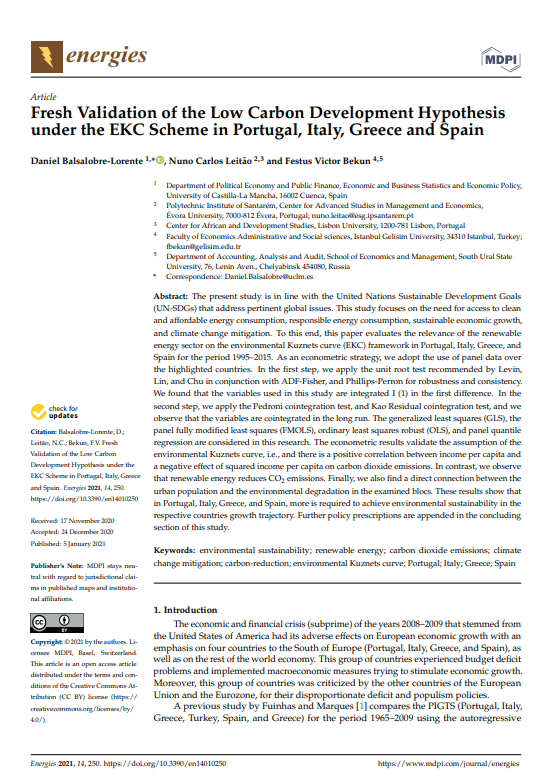
Fresh Validation of the Low Carbon Development Hypothesis under the EKC Scheme in Portugal, Italy, Greece and Spain
Abstract:
Fresh Validation of the Low Carbon Development Hypothesis under the EKC Scheme in Portugal, Italy, Greece and Spain is in line with the United Nations Sustainable Development Goals (UN-SDGs) that address pertinent global issues. This study focuses on the need for access to clean and affordable energy consumption, responsible energy consumption, sustainable economic growth, and climate change mitigation. To this end, this paper evaluates the relevance of the renewable energy sector on the environmental Kuznets curve (EKC) framework in Portugal, Italy, Greece, and Spain for the period 1995–2015. As an econometric strategy, we adopt the use of panel data over the highlighted countries. In the first step, we apply the unit root test recommended by Levin, Lin, and Chu in conjunction with ADF-Fisher, and Phillips-Perron for robustness and consistency. We found that the variables used in this study are integrated I (1) in the first difference. In the second step, we apply the Pedroni cointegration test, and Kao Residual cointegration test, and we observe that the variables are cointegrated in the long run. The generalized least squares (GLS), the panel fully modified least squares (FMOLS), ordinary least squares robust (OLS), and panel quantile regression are considered in this research. The econometric results validate the assumption of the environmental Kuznets curve, i.e., and there is a positive correlation between income per capita and a negative effect of squared income per capita on carbon dioxide emissions. In contrast, we observe that renewable energy reduces CO2 emissions. Finally, we also find a direct connection between the urban population and the environmental degradation in the examined blocs. These results show that in Portugal, Italy, Greece, and Spain, more is required to achieve environmental sustainability in the respective countries growth trajectory. Further policy prescriptions are appended in the concluding section of this study.
Quotation:
Balsalobre-Lorente, D., Leitão, N.C., Bekun, F., V. (2021). Fresh Validation of the Low Carbon Development Hypothesis under EKC Scheme in Portugal, Italy, Greece, and Spain. Energies 2021. 14(1), 250. https://doi.org/10.3390/en14010250
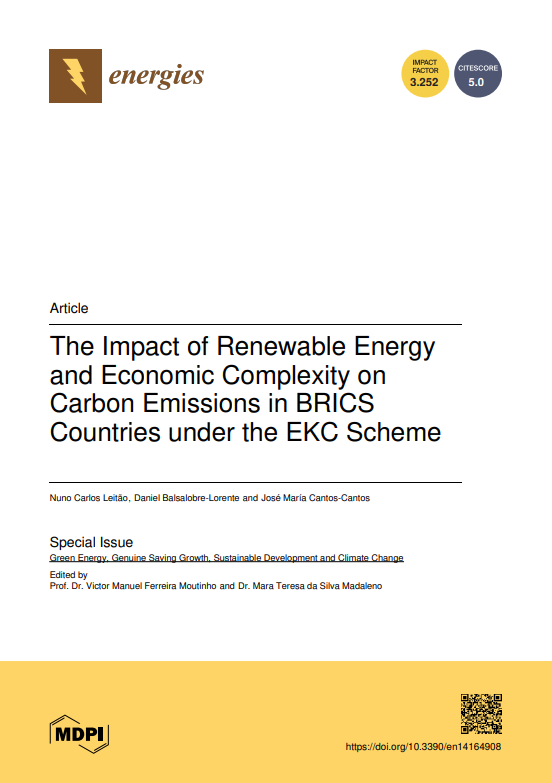
The Impact of Renewable Energy and Economic Complexity on Carbon Emissions in BRICS Countries under the EKC Scheme
Abstract:
Economic complexity makes it possible to assess the development of the countries, the relations of innovation, and the differentiation of products. The Impact of Renewable Energy and Economic Complexity on Carbon Emissions in BRICS Countries under the EKC Scheme considers the links between the hypotheses of the Kuznets environmental curve and economic complexity using panel data for the group of BRICS countries (Brazil, Russia, India, China, and South Africa) from 1990 to 2015. As an econometric strategy, this study considered the panel fully modified least squares (FMOLS), panel dynamic least squares (DOLS), fixed effects (FE), and Panel Quantile Regression. The empirical results showed that economic complexity, income per capita, renewable energy, and carbon dioxide emissions are integrated with the first difference when applying the unit root test. The arguments of Pedroni and Kao cointegration tests were also used. According to these results, the variables used in this research are cointegrated in the long run. The results validated the arguments of the EKC hypothesis, i.e., the income per capita and squared income per capita are positively and negatively correlated with CO2 emissions. Moreover, economic complexity and renewable energy aim to improve environmental damage and climate change.
Quotation:
Leitão, N.C., Balsalobre-Lorente, D., Cantos-Cantos, J.M. The Impact of Renewable Energy and Economic Complexity on Carbon Emissions in BRICS Countries under the EKC Scheme. Energies 2021, 14, 4908. https://doi.org/10.3390/en14164908
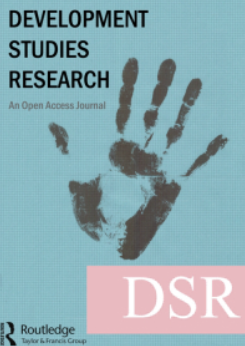
Identifying differences and similarities between donors regarding the long-term allocation of official development assistance
Abstract:
Advanced countries have pledged to mobilize additional financial resources to developing countries, including funding from multiple sources other than official development assistance (ODA), known as foreign aid. However, the effect of the novel coronavirus pandemic has raised doubts about the feasibility of such a pledge, highlighting, once again, the possible role of ODA and the importance of explaining its allocation, which could be of vital relevance for understanding its effectiveness. Identifying differences and similarities between donors regarding the long-term allocation of official development assistance analyzes a vast number of bilateral and multilateral donors by applying a novel methodology in the context of aid allocation – principal-component factor analysis – covering the period 1990–2015. The results revealed four distinct clusters of donors: (i) the proportionally largest Western European donors, characterized by a significant number of beneficiaries, especially low-income countries; (ii) donors that are predominantly driven by structural links with recipients, especially links derived from colonial connections; (iii) a group of mainly Eastern European donors who are engaged with lower-income countries in Eastern Europe and Western Asia; and (iv) a group of Asian and Oceanian donors that select their partners mainly based on the geographical proximity criterion.
Quotation:
Paulo Francisco, Sandrina B. Moreira & Jorge Caiado (2021) Identifying differences and similarities between donors regarding the long-term allocation of official development assistance, Development Studies Research, 8:1, 181-198, DOI: 10.1080/21665095.2021.1954965

Navigating ontological (in)security in EU–Africa relations
Abstract:
When the first six members of the European Economic Community (EEC) took that initial step towards deeper integration that has culminated in what is now the European Union (EU), they also agreed “to associate with … the non-European countries and territories which have special relations with Belgium, France, Italy, the Netherlands and the United Kingdom”. Six decades on and several attempts to re-set EU-Africa relations, it is appropriate to take stock of the relationship especially in light of changes in both continents since 2000. This article draws on the idea of ontological security to understand the nature of changes and continuities in the EU’s engagement with Africa. It argues that EU-Africa relations that have relied on a coloniality of power have also been crucial to the EU’s ontological security. However, increasing African agency and new external actors like China in Africa are challenging this security. While challenges to the EU’s ontological security have been viewed as primarily internally constituted, external challenges within a specific context provides the opportunity to rethink what ontological security demands. Importantly, Navigating ontological (in)security in EU–Africa relations highlights why a partnership of equals is an urgent imperative for the future of EU-Africa relations, although it remains elusive.
Quotation:
Toni Haastrup, Niall Duggan & Luis Mah (2021) Navigating ontological (in)security in EU–Africa relations, Global Affairs, 7:4, 541-557, DOI: 10.1080/23340460.2021.1981144
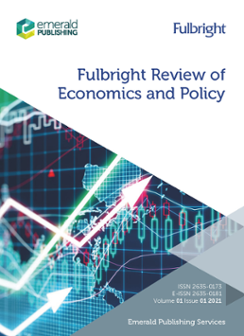
Common causes in grassroot development: a case for community-based and community-driven response in the postpandemic era
Abstract:
The purpose of Common causes in grassroot development: a case for community-based and community-driven response in the postpandemic era is to determine the impact of community-based and driven approaches during the lockdowns and early periods of the pandemic. The study examines the impact and perceptions of the state-led intervention. This would help to discover a better approach for postpandemic interventions and policy responses. This article used the inductive method and gathered its data from surveys. In search of global opinions on COVID-19 responses received in communities, two countries in each continent with high COVID-19 infection per 100,000 during the peak period were chosen for study. In total, 13 community workers, leaders and members per continent were sampled. The simple percentile method was chosen for analysis. The simple interpretation was used to discuss the results. The study showed that poor publicity of community-based interventions affected awareness and fame as most were mistaken for government interventions. The study found that most respondents preferred state interventions but preferred many communities or local assessments of projects and interventions while the projects were ongoing to adjust the project and intervention as they progressed. However, many preferred community-based and driven interventions.
Quotation:
Patrick-Agulonye, U.V. (2021). “Common causes in grassroot development: a case for community-based and community-driven response in the postpandemic era” Fulbright Review of Economics and Policy, Vol. 1 No. 2, pp. 186-204. https://doi.org/10.1108/FREP-09-2021-0056

State of the Art About COVID-19’s Impact on Santiago University, Cape Verde
Abstract:
The COVID-19 pandemic has become a critical challenge for the higher education sector worldwide. Under such a circumstance, the exploration of the capacity of this sector to adapt to such a state of uncertainty has become of huge importance. In this chapter, State of the art about COVID-19 impact in Santiago University – Cape Verde, the authors critically reflect on the Cape Verdean teaching experience during the early COVID-19 lockdown. This is an exploratory case study based on a qualitative approach with an aim to reflect on new practices of teaching under a pandemic emergency. Based on the teaching experience of teaching in Santiago University, they explain how this university has changed from a face-to-face to an online teaching system and stress the challenges and opportunities that appear from this transition process. This chapter concludes that this strategy has become an opportunity to the university since it consistently raised the number of international students cooperating with them and also that the more adaptive and resilient approaches to online teaching were also a success.
Quotation:
Sarmento, E., Monteiro, J. (2021). Capítulo 16: State of the art about COVID-19 impact in Santiago University – Cape Verde. In Loureiro, Sandra & Guerreiro, João (eds.) Handbook of Research on Developing a Post-Pandemic Paradigm for Virtual Technologies in Higher Education. ISBN13: 9781799869634; ISBN10: 1799869636. IGI Global (Q2, SJR:0,338)
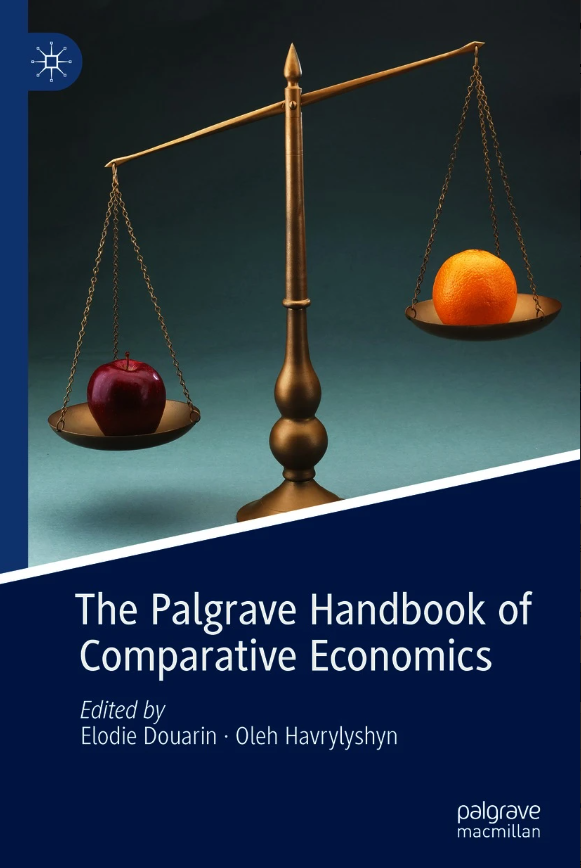
Reform Design Matters: The Role of Structural Policy Complementarities
Abstract:
In this chapter, Reform Design Matters: The Role of Structural Policy Complementarities, we discuss possible interactions across structural policy domains. While relatively more studied in the context of the post-communist transition literature, our survey suggests that relationships of this type hold more generally and can be important to improve our understanding of the relationship between structural reforms and long-run economic growth. Given its potential relevance for the design of successful reform packages, exploring in a more exhaustive way the notion that the effect of a given reform on economic growth depends on the progress made in other policy areas should be a priority point for future research. This may be particularly relevant to help unlock the growth potential of many developing and emerging countries, namely concerning their integration in the global economy. The authors would like to thank Elodie Douarin and Oleh Havrylyshyn for very useful comments on the first draft of this paper. The views expressed in this paper are those of the authors and do not necessarily reflect those of the OECD and its Member countries. Rocha acknowledges financial support from Fundação para a Ciência e Tecnologia (Portugal) through research grant UIDB/05069/2020.
Citação:
Oliveira-Martins, J., da Rocha, B.T. (2021). Reform Design Matters: The Role of Structural Policy Complementarities. In: Douarin, E., Havrylyshyn, O. (eds) The Palgrave Handbook of Comparative Economics. Palgrave Macmillan, Cham. https://doi.org/10.1007/978-3-030-50888-3_19

Ready or not? The ultimate push of Timor-Leste to join ASEAN
Abstract:
A persistent concern raised by member states of the Association of South East Asian Nations (ASEAN) is that Timor-Leste’s readiness for membership is not enough, as Dili, the smallest economy in Southeast Asia, may not be able to sign and implement key commitments, nor to participate in all ASEAN institutions and work programmes. Since its formal request for membership in 2011, Timor-Leste has recently stepped up its efforts for ASEAN membership, with the initial technical support of the Japan International Cooperation Agency and, particularly, the enhanced support of the Asian Development Bank. In 2019, there has been a step change in momentum towards accession, with clear ASEAN statements signalling progress in this regard. The first ever ASEAN fact-finding mission to Timor-Leste to assess the country’s potential for membership concluded successfully in September 2019. Two more fact-finding missions are planned for 2020. We assess in this paper Timor-Leste’s readiness for membership in the three pillars of the ASEAN community: economic, socio-cultural, and political security. In Ready or not? The ultimate push of Timor-Leste to join ASEAN, we assess how recent developments address the concerns historically raised by some ASEAN member states about Timor-Leste’s membership. We conclude that the Cambodian and, particularly, the Indonesian presidencies of the ASEAN in 2022 and 2023 could be an important landmark for Timor-Leste’s accession to the Association.
Quotation:
Martínez-Galán, E. (2021). ‘Ready or not? The ultimate push of Timor-Leste to join ASEAN’. Chapter 4B, pp. 405-435 in Leandro, F.J.B.S., dos Santos, P.P. and Li, Y. (eds) China and Portuguese-speaking Small Island States: From sporadic bilateral exchanges to a comprehensive multilateral platform. City University of Macau. Macao. China. ISBN 978-99981-956-3-9

Literatures and Cultures of the Indian Ocean
Abstract:
Portuguese Studies is a biannual multi-disciplinary journal dedicated to research on the cultures, literatures, history, and societies of the Lusophone world. Ana Mafalda Leite, Elena Brugioni, and Jessica Falconi were the organizers of this issue of the journal, Literatures and Cultures of the Indian Ocean. The president of the Editorial Board for 2021 is Catarina Fouto, and the Journals editor is Emanuelle Rodrigues Dos Santos. The journal is published by the Modern Humanities Research Association (MHRA), an international organization with members in all parts of the world. The aim of the Association is to encourage and promote advanced study and research in the field of modern humanities. It is concerned to break down barriers between scholars working in different disciplines and to maintain the unity of humanistic scholarship in the face of increasing specialization. The present volume results frorn the scholarly work conducted by members of the research project NILUS — Narratives Ofthe Indian Ocean in the Lusophone Space. The main purpose of the project consisted in establishing a theoretical and disciplinary connection between Lusophone Literary, Visual and Cultural Studies and the transdisciplinary field Of Indian Ocean Studies. The project on the written and visual narratives hailing from, or related to, the territories formerly colonized by Portugal along the Indian Ocean, specifically Mozambique, Goa, and East Timor. This volume, therefore, constitutes an attempt to bridge a significant critical and disciplinary gap, motivated by an almost total lack of dialogue among the above-mentioned fields of study. This lack of dialogue becomes ever more apparent if we bear in mind the increasingly central role played by historical, anthropological, literary, and cultural studies of the Atlantic Ocean in addressing colonial and postcolonial cultural and identity-related outputs and relations from the territories that Out Of Portuguese colonial rule. Consider, for instance, the influence of the notion of Brown Atlantic (Atlântico Pardo), de,’eloped by the anthropologist Miguel Vale de Almeida as a counterpoint to Paul Gilroy’s Black Atlantic, or the use of the Portugal -Brazil-Angola triangulation in comparative and transnational- oriented literary and cultural studies.4
Quotation:
Leite, A.M.; Brugioni, E. & Falconi, J. (2021) (eds). “Literatures and Cultures of the Indian Ocean”, Portuguese Studies 37.2.

Enchanted Things to Narrate the Oceans: João Paulo Borges Coelho and Luís Cardoso
Abstract:
Enchanted Things to Narrate the Oceans: João Paulo Borges Coelho and Luís Cardoso stems from the research developed under the NILUS project and, in particular, falls within the research strand that explored the role of material culture and materiality in contemporary narratives of the Lusophone Indian Ocean. The paper focuses on the short story ‘O Pano Encantado’ (2005) by João Paulo Borges Coelho and the novel Requiem para o Navegador Solitário (2007) by Luís Cardoso – two narratives set in island spaces, the small island of Mozambique and the island of Timor, respectively. It aims to validate the hypothesis that the appeal to material culture and materiality offers a way of narrating and remembering (in) the Indian Ocean from different shores of its range. The article was produced for the Modern Humanities Research Association (MHRA), an international organization with members in all parts of the world. The aim of the Association is to encourage and promote advanced study and research in the field of modern humanities. It is concerned to break down barriers between scholars working in different disciplines and to maintain the unity of humanistic scholarship in the face of increasing specialization.
Quotation:
Falconi, J. (2021). Enchanted Things to Narrate the Oceans: João Paulo Borges Coelho and Luís Cardoso. Portuguese Studies, 37(2), 224–241. https://doi.org/10.5699/portstudies.37.2.0224





